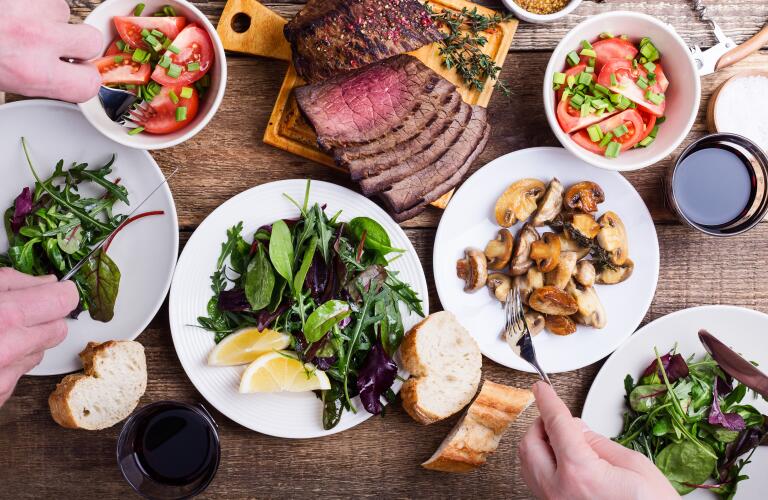If you've ever looked closely at a Nutrition Facts label, you might have noticed a phrase like "2,000 calories a day is used for general nutrition advice." While this guideline offers a basic understanding of how a food item contributes to a typical daily diet, it's important to remember that everyone's calorie needs are unique.
The idea that 2,000 calories is the magic number for everyone is a common misconception. Your ideal daily calorie intake is influenced by several personal factors:
- Age: Calorie needs typically decrease with age.
- Sex: Men generally require more calories than women due to differences in body composition and metabolism.
- Weight and Height: Your body size and composition play a role in determining your calorie requirements.
- Activity Level: Individuals who are more physically active need more calories to fuel their bodies.
- Health Goals: Whether you want to maintain, lose, or gain weight influences your calorie targets.
So, how can you determine the right number of calories for you? The best approach is to consult a registered dietitian who can create a personalized plan tailored to your specific needs and goals. They will consider all the factors mentioned above and provide guidance on how to adjust your calorie intake accordingly.
In the meantime, here are some general guidelines:
- Adults: Most adults need between 1,600 and 3,000 calories per day to maintain their weight.
- Women: Women generally need fewer calories than men, often falling in the 1,600 to 2,400 calorie range.
- Men: Men typically require more calories, often between 2,000 and 3,000 calories per day.
Remember, these are just rough estimates. Your individual needs may vary significantly depending on your personal circumstances. Don't hesitate to seek personalized advice from a registered dietitian to ensure you're fueling your body optimally for your health and wellness goals.
Calories Demystified: Your Body's Fuel
Calories are simply a unit of measurement for the energy contained in food. This energy comes primarily from three macronutrients: fats, proteins, and carbohydrates. When you eat, your body breaks down these nutrients and converts them into energy to fuel your daily activities, from breathing to running a marathon.
If you consume more calories than your body requires for these functions, the excess energy is stored as fat. This is why overeating can lead to weight gain. Conversely, if you eat fewer calories than your body needs, it will tap into stored fat for energy, resulting in weight loss.
Calorie Needs: A Personal Equation
Your individual calorie needs are influenced by a variety of factors, making it essential to understand your unique requirements. These factors include:
- Age: Younger individuals generally have higher calorie needs due to growth and development, while older adults may need fewer calories as their metabolism slows down.
- Gender: Men typically have higher calorie needs than women due to differences in body composition and muscle mass.
- Weight: Heavier individuals require more calories to maintain their weight, while lighter individuals need fewer.
- Height: Taller individuals typically have higher calorie needs due to their larger body size.
- Muscle Mass: Muscle tissue burns more calories at rest than fat tissue, so those with more muscle mass will need more calories.
- Physical Activity Level: The more active you are, the more calories you'll need to fuel your workouts and daily movements.
To determine your specific calorie needs, it's best to consult a registered dietitian. They can create a personalized plan that takes into account all of these factors and aligns with your health and wellness goals.
How to Determine Your Calorie Needs: Tools and Resources
Determining your precise calorie needs doesn't have to be a guessing game. Several online tools can help you calculate your individual requirements:
-
Body Weight Planner: This tool offered by the National Institutes of Health allows you to input your weight, height, age, sex, and activity level to calculate your current calorie needs for weight maintenance.
You can also set a goal weight and timeline to see how many calories you'd need to consume to reach that goal. -
Registered Dietitian: If you're an MD Anderson patient, or even if you're not, consulting a registered dietitian is the best way to get personalized guidance on your calorie needs. They can take into account your unique circumstances, health goals, and dietary preferences to create a tailored plan that works for you.
Eating for Health: Beyond Calories
While knowing your calorie needs is essential, it's equally important to focus on the quality of your food choices. Regardless of your specific calorie target, prioritize nutrient-rich foods like whole grains, vegetables, fruits, beans, nuts, and seeds. These foods provide essential vitamins, minerals, and fiber that support your overall health and well-being.
Remember, a healthy diet is not just about counting calories; it's about nourishing your body with wholesome foods that fuel your daily activities and contribute to your long-term health.
Calories for Weight Loss: Creating a Deficit
Successful weight loss hinges on creating a calorie deficit, which means consuming fewer calories than your body expends. This can be achieved through a combination of dietary changes and increased physical activity.
However, it's important to note that your calorie needs will change as you lose weight. As you shed pounds, your body mass decreases, and consequently, you burn fewer calories at rest. To maintain a consistent calorie deficit and continue losing weight, you'll need to adjust your calorie intake over time.
Several tools can help you track your progress and adjust your calorie goals:
- Weight Loss Predictor Tools: These tools estimate your weight loss trajectory based on your current weight, calorie intake, and activity levels.
- Body Weight Planner: This tool from the National Institutes of Health allows you to adjust your goal weight and see how your calorie needs change as you progress.
- Weight Loss Calculator: These calculators can help you determine your daily calorie deficit based on your weight loss goals.
Remember, weight loss is a journey, not a sprint. It's important to be patient, consistent, and make sustainable changes to your diet and lifestyle.
Healthy Swaps for Weight Loss
Making small changes to your daily food and drink choices can add up to significant calorie savings and support your weight loss efforts. Here are some simple swaps recommended by dietitians:
- Swap sugary sodas for sparkling water: This eliminates empty calories and reduces sugar intake.
- Swap deep-fried foods for baked or broiled options: This significantly reduces fat and calorie content.
- Swap fatty protein sources for lean alternatives: Choose lean cuts of meat, poultry, or fish, and opt for low-fat dairy products.
- Swap chips for fruits and nuts: This provides healthy fats, fiber, and nutrients while satisfying your cravings.
By incorporating these swaps and monitoring your calorie intake, you can create a sustainable calorie deficit and achieve your weight loss goals while maintaining a healthy and balanced diet.













0 Comments